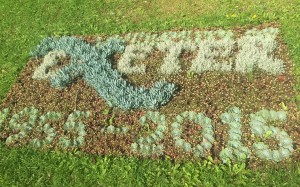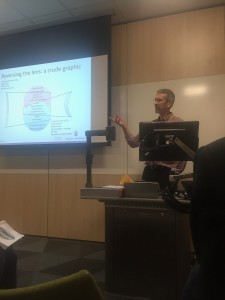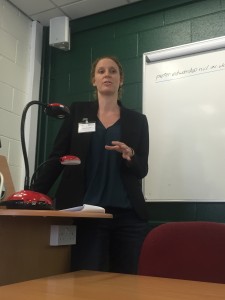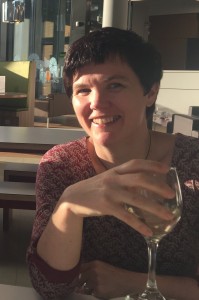Marsden team in the UK
September 23, 2015
 The ‘Old Country’ recently played host to three members of the Marsden team who were on a Conference ‘Bombing’ trip, presenting some of the initial empirical findings and conceptual developments from the project. The team had organised panel sessions on the project at both the Royal Geographical Society/ Institute of British Geographers Conference in Exeter, and the Development Studies Association (DSA) Conference in Bath, and Glenn, Sharon and Emma R. travelled to the UK as presenters. The geographic and temporal proximity of the two events (a hundred miles or so, and two days apart) made the lengthy trip worthwhile, and allowed us to showcase the work of the two PhD students (Emma and Emma[1]) in front of an international audience.
The ‘Old Country’ recently played host to three members of the Marsden team who were on a Conference ‘Bombing’ trip, presenting some of the initial empirical findings and conceptual developments from the project. The team had organised panel sessions on the project at both the Royal Geographical Society/ Institute of British Geographers Conference in Exeter, and the Development Studies Association (DSA) Conference in Bath, and Glenn, Sharon and Emma R. travelled to the UK as presenters. The geographic and temporal proximity of the two events (a hundred miles or so, and two days apart) made the lengthy trip worthwhile, and allowed us to showcase the work of the two PhD students (Emma and Emma[1]) in front of an international audience.
A common thematic thread that connected the two conferences was an acknowledgment of the role of human society in shaping, both intentionally and inadvertently, social and environmental realities today. The team’s project work therefore fit nicely within this space, and the two panel sessions appeared to address an otherwise absent voice, being one that explicitly recognised the part of the multinational (mining and tourism) companies in the formation of livelihood outcomes. In this regard, findings emerging from the PhD research provided insightful case study examples that urged listeners to consider the complexities of corporate – community relationships.
The presentations went well, and the feedback – especially at the DSA – provided good reminders of some issues that we need to keep in mind with the project: the relative absence of the state in regulating and mediating corporate community relations across the two countries (Fiji and Papua New Guinea), the need to maintain a critical eye on corporate motives (which we think we are doing!), the influence of actors within the corporations, the complexities around funding of CCD activities (such as the use of tax credits in the mining sector, and guest donations in tourism), and the question of temporality (Glenn’s still trying to figure out the last of these…).
We were also delighted to be reunited in the RGS panel with Emma Mawdsley and Cheryl McEwan (who Glenn and Regina had worked with earlier in the year on private sector and community development research), and had a really useful contribution to our DSA panel from Tomas Fredrikson from University of Manchester who presented on his work looking at CSR efforts of mining companies in Ghana, Zambia and Peru.
Like all these events, we also got to hear people present on a wide body of research – some highlights (for Glenn) were Anna Tsing’s beautifully poetic account of ‘Feral geographies: life in capitalist ruins’, a provocative ‘think piece’ by James Fergusson on rethinking notions of gift and exchange (promoting instead the idea of ‘demand sharing’), and a lovely piece by an old colleague Roger McLean that questioned, on the basis of 40 years of detailed fieldwork in Kiribati, the received wisdom that coral atolls are necessarily sinking due to sea-level rise.
Sharon spent much of her time at the two conferences running between sessions – in addition to presenting Emma H.’s papers and co-authoring a presentation with Glenn, she also gave papers on her ‘other’ research on volunteering and social media. She managed a total of five presentations in under a week, which must be some sort of conference record! Highlights for Sharon included the DSA final keynote by Branco Milanovic whose insights into inequality may find their way into the Development and Inequality paper she currently teaches; discussions with Doug Speight, whose work on digital media and mining in Latin America connects with both her doctoral and post-doctoral research; and contacts made with a range of people with shared interests in volunteering and in ICT for development.
For Emma (R) conference highlights included hearing the interesting feedback stemming from our CCD panel presentations, and at the DSA conference listening to Allister McGregor talk about the intricacies of relational wellbeing in development (‘The Stuff that Makes it Work’) and Melania Calestani share her experiences learning about wellbeing in Bolivia (‘An Anthropology of Well-being in the city of El Alto, Bolivia’). Although not technically a ‘conference’ highlight, it should also be noted that post-conferences drinks at ‘The Imperial’ in Exeter were also very enjoyable… Although in hindsight, visiting an establishment with a name like that, perhaps we were lucky not banned from attending the DSA conference outright!
In between all of this, there was some connecting with old and new friends, a small amount of sightseeing, some sun, some rain, a squeaky toilet door, mis-functioning ATMs, occasional technological failures, and some pretty ordinary coffee (we couldn’t have everything go well!). Overall it was encouraging to get such an affirming response to our work – with people commenting positively on the novelty, the necessity and the value of the research we’re engaged in.
[1] Emma Hughes was also due to travel with us, but had to withdraw: Sharon gallantly offered to step up and present Emma’s papers at both events.




Leave a Reply